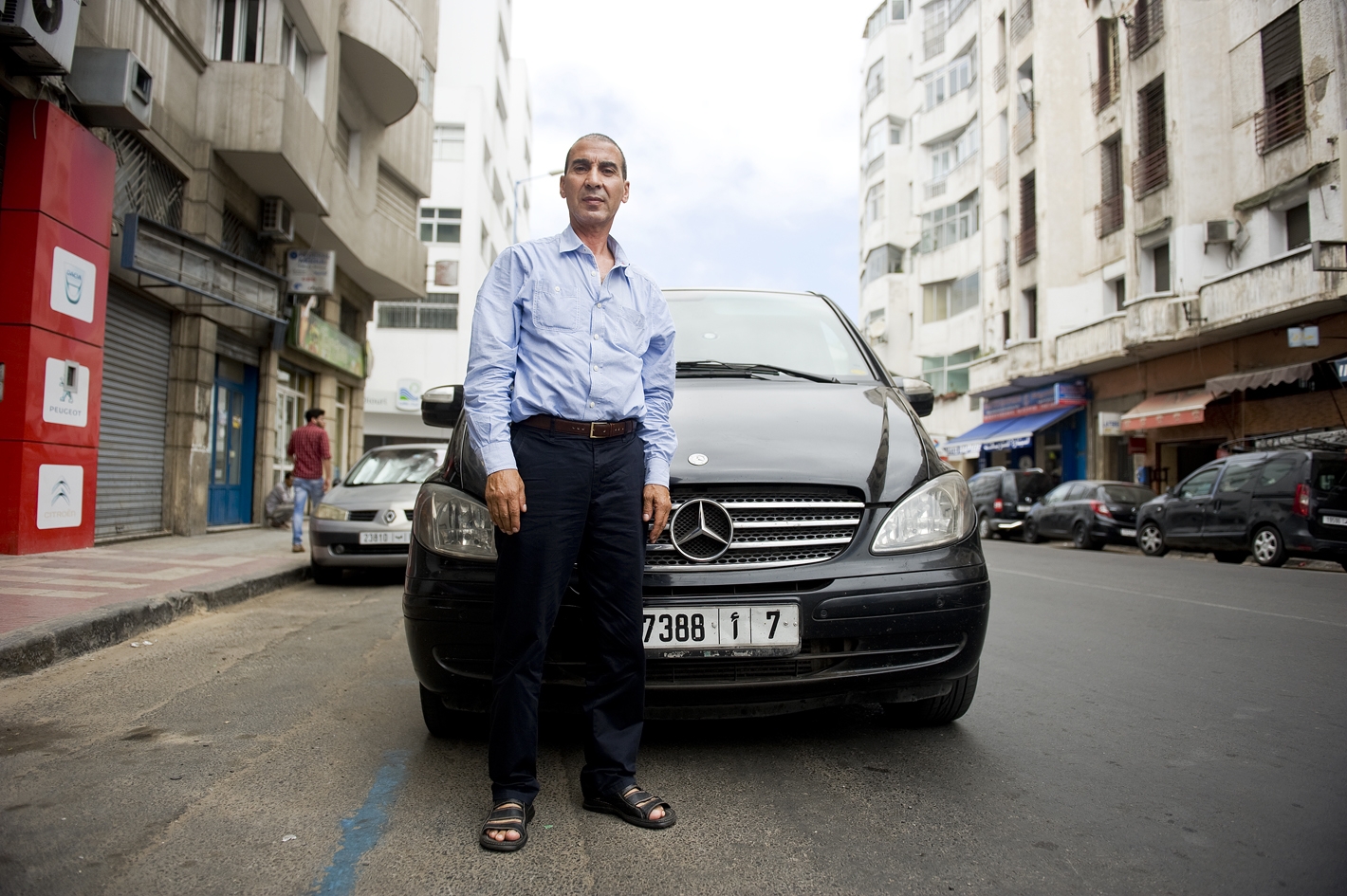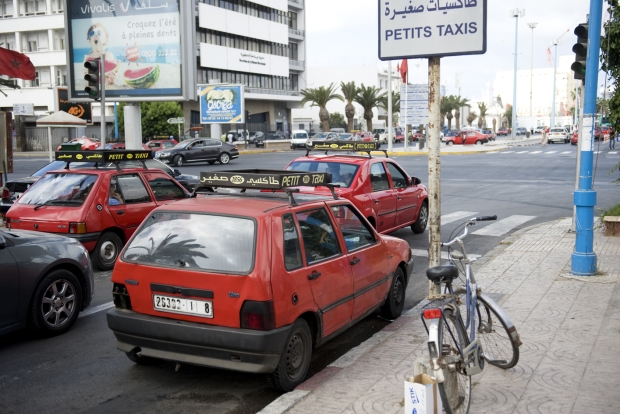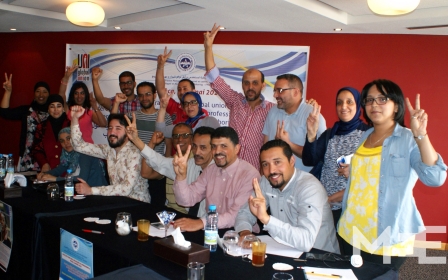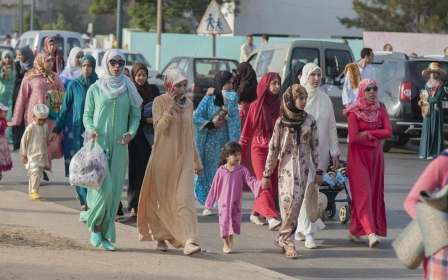Morocco - Uber’s first steps in the Maghreb

CASABLANCA - For the past few days, driver Abbes Farhane, 50, has been starting his car at seven in the morning, after spraying the inside with specially bought perfume.
He wants his customers to feel good in the Mercedes Viano he drives for Uber in Casablanca, so he keeps it clean, wears impeccable clothing and is friendly in Arabic, French and English. As a finishing touch, he sprays a hint of Davidoff. “I make a basic salary, not enough to live on,” he says. “But every week I can get a bonus of up to 500 dirhams ($50), which would make it a good living. For that, the clients have to give me a five-star rating.”
The driver-on-demand company Uber landed in Morocco’s economical hub and traffic-clogged Casablanca last week, a city with more than five million people and millions of smartphone users. After Cairo, it’s the second city in North Africa where the company has set up shop. As soon as it listed the Western Sahara (which Morocco has seen as part of the kingdom since 1975) as an independent country in its country-list, Uber created a buzz straight away.
Uber is basically a smartphone app that links customers and private drivers. The service started on 21 July in Casablanca and since then the customer base has been growing, says Farhane. On the first day he had four rides, on the second day there were seven, and on the third day the number had risen to 10. “I really think there is a big market for this," he said. "Moroccans like service and comfort.”
Farhane pulls up next to Casa Port train station about 15 minutes after Middle East Eye contacted him through the app. He shakes his head, driving through Casablanca: no, the Mercedes Viano is not his. It is owned by the company he works for, which in turn is under contract with Uber.
“I just drive it for 10 hours a day, from 7am to 5pm,” said Farhane, who is a former taxi driver and chauffeur for tourists. “Then a colleague takes over until three in the morning.”
The destination is Rue Mohamed Diouri; it takes a while to find it on the smartphone app, as Mohamed with two Ms is not found (the map app spells it with three Ms). The 0.7-mile ride will cost 30 dirhams ($3), which is the minimum charge.
Payment happens automatically via credit card or PayPal, so there’s no money changing hands. Once a car is ordered, the app gives the customer the name, photo, license plate and telephone number of the driver.
That gives the service "unprecedented safety," says general manager Meryem Belqziz of Uber Casablanca. As Uber is still in the "test phase" here, she chooses to only answer questions through email. She writes: “Additionally, riders have access to a live GPS-enabled map that they can share with friends and loved ones who can track their progress, ensuring they arrive safely.”
Uber has a history of incidents involving thefts and allegations of sexual assault, but Belqziz insists women should be able to use the service safely on their own.
“Uber [in Morocco] works with licensed companies which need a specific license from the Ministry of Tourism," Belqziz said. "These companies employ well-seasoned drivers with no criminal record. We screen the companies, the drivers and the cars.”
At Casa Port train station, local drivers of the red "petit taxis" wait for customers. None of the taxi drivers that MEE spoke to had heard of the app before, and once it was explained, they were not sure what to think.
“I rent this taxi by the day and I have to pay for gas," says Rachid, a slender-looking driver in his 40s. "So first I have to make 350 dirhams ($35) every day before I start making any kind of profit. Competition is already high. But I think Uber is too pricy to be a real threat to us.”
The Confédération Démocratique du Travail (CDT), one of Morocco’s unions, doesn’t take the new competition lightly however. In Casa, it saw the market for the 15,000 taxis (8,500 small, 6,500 big ones) already diminish after the tramways were built. Work is slow as it is, says Abdelkarim Cherkaoui, member of the national bureau of the CDT and himself a taxidriver in Casa. “People take the taxi when they are in a hurry, on their way to the hospital or the courthouse. If people have more time, they take the bus or tram, which are cheaper.”
His colleague Abderrahim Amaayach, also a member of the national bureau, said, “Uber might work with the permission of the Ministery of Tourism but that permission is meant for tourists, not for an individual taxi-service," he says. “Uber is like a guy working in a hotel, calling his friend with a nice car to take one of the guests to the airport. We see it as clandestine, and we’re thinking about a protest.”
A few days later another Uber driver pulls up at the Casa Port train station for a second test, in a brand new Volkswagen Touareg. The destination this time is the Morocco Mall at the end of the Corniche, about seven miles away. The app estimates it will cost between 78 and 90 dirhams. In the end the trip amounts to 83 dirhams, just over $8. A small taxi would cost 30 dirhams during the daytime, a shared large taxi about five dirhams, and a bus even less.
Where in other countries Uber has been a cheaper alternative for the regular taxis, in Casablanca it is actually more expensive.
Middle-class market
Belqziz acknowledges that Uber aims for the urban middle class and businesspeople. There is an untapped demand that is not catered for by the current transportation services, she says. “We see a great potential in the Moroccan market. Uber will have higher prices than taxis but offer a different level of service.”
As the Volkswagen Touareg driver - who asked to remain anonymous - steers his car through the hectic Casablanca traffic, he points at an old, rusty Mercedes 240 crammed with seven people. The chauffeur of the "grand taxi" has halted in the middle of the street, facing upcoming traffic.
“Look at the state of that thing - very unsafe," says the Uber driver. “The car in the middle of the street like that … Does the guy even know how to drive? It’s just dangerous.”
The Uber driver, a 26-year-old student, thinks the new service is "genius, very effective". He estimates there are about 10 Uber cars in Casablanca now. “It’s a test phase. The number of cars, maybe even the price, everything can change. We’re already very busy though. Five minutes after I drop you off, I’ll have the next ride. This is summer, so many people have left the city. In September, it will be crazy.”
Throughout the first few days of Uber starting its service in Casablanca, Amine Badre, 32, has used it "at least 10 times," he says. Badre is a creative director of the company Initiative Digital and has his own car. “But Casa is very busy with traffic. If you drive yourself, you lose a lot of time waiting without being able to work.”
He used to take normal taxis, but because in Morocco people usually share them, they hardly ever take the shortest route. Badre is not a big fan of sharing a taxi, so he also uses other taxi services in Casablanca like iTaxi and Careem (app-based) and Taxi Vert (order by telephone). Those are cheaper, but not by much, Badre says.
“Uber is more expensive, yes. It’s definitely not for everybody. That’s why there will be no all-out taxi war like there has been in France. Although I’m convinced Uber will drop the prices in the future.”
If the prices of Uber in Casablanca remain on the same level, it will probably keep its kind of exclusive user base. The Uber driver himself, as he pulls up to curb of the Morocco Mall, says that he would not be able to afford Uber in his daily life.
“I don’t mind," he says. "I see it as an extra service for Morocco. It’s weird though. I am young, I have a smartphone, but until recently I had never heard of it. I don’t think a lot of Moroccans know it yet.”
That is something that his colleague Farhane also noticed. Most of his customers so far have been Moroccans, but mainly people who had been outside the kingdom for a while - which is where they used Uber for the first time, Farhane says.
“People still have to get to know it, but I think it will be a big success. And expensive? The other day I drove two people to the airport, which cost around 300 dirhams ($30), I think. If a tourist takes a 'grand taxi,' they will pay at least that, and probably more.”
New MEE newsletter: Jerusalem Dispatch
Sign up to get the latest insights and analysis on Israel-Palestine, alongside Turkey Unpacked and other MEE newsletters
Middle East Eye delivers independent and unrivalled coverage and analysis of the Middle East, North Africa and beyond. To learn more about republishing this content and the associated fees, please fill out this form. More about MEE can be found here.





